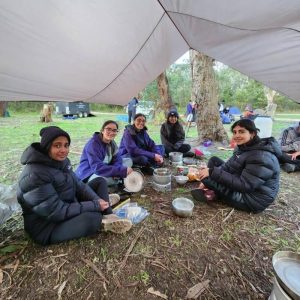Excellence, Compassion and Growth
It’s been a fortnight of thought, effort and encouragement across the Senior School. In every space, our shared values have set the tone for learning and belonging.
House Competition
This year’s House Visual Arts Competition centred on the value of Excellence. The artworks submitted were nothing short of inspiring. From each House, the top nine pieces were selected by the House Captains and Heads of House to form a cohesive collage that captured the spirit of excellence.
These collages are pictured below. Congratulations to Trist House as winners of the competition and well done to everyone involved!




The House Public Speaking Competition focused on the value of Compassion. Each House presented two speeches and the standard was exceptional, with messages that were powerful and moving.
- Best Speaker in the Year 7-9 category: Zainab F
- Best Speaker in the Year 10-12 category: Sienna KC
- Winning House: Reid
Below is the speech presented by Deep S of Leaver House:
Every day, someone in this school goes home feeling invisible. What if you were the reason they didn’t?
Every morning, hundreds of us walk through these gates. Some of us are excited. Some of us are tired. And some of us are carrying problems no one else can see – stress about school, or things happening at home.
Now imagine, in that exact moment, someone turns to you and says, “Are you okay? I’m here for you.” Suddenly, the weight doesn’t feel quite so heavy. That is the power of compassion. It’s the light that reminds us we’re never truly alone.
Compassion isn’t weakness, it’s strength. It’s the courage to notice when someone’s struggling, the courage to care, and the courage to act. And in a school community, compassion doesn’t just change one person’s day, it transforms the whole culture.
Think about it. When this quality becomes the culture of a school, great things happen. The shy kid raises their hand in class because they know they won’t be laughed at. The new student doesn’t spend lunchtime alone, because someone chooses to sit with them.
Even mistakes in class become less terrifying, because people know failure will be met with encouragement, not judgment.
And here’s the truth: when compassion grows, so does everything else. Bullying decreases. Confidence rises. Mental health improves. And yes, grades even go up. Because people do better when they feel better. That’s not just common sense, it's science.
But compassion isn’t always easy. It means putting down your phone and actually listening. It means forgiving when anger feels easier. It means sticking up for a classmate, even if nobody else is brave enough to. That’s why compassion is leadership at its purest.
Not a badge. Not a title. But humanity.
So how can we foster a positive school environment? Not with speeches or posters, but simply with daily choices. Choosing to listen. Choosing to sit with someone who’s left out. Choosing to cheer others on, even when we’re struggling ourselves.
One small act might not change the world but together, they change our school.
So today, I leave you with this: In the years to come, people may not remember what ATAR you got, or the awards you won. But they will always remember how you made them feel.
Be remembered for being compassionate. Let it be your language. Let it be your legacy.
Let’s shape a school where every student feels seen, valued, and supported.
Thank you.
Year 9 Adventurous Journey
Last week, our Year 9 students embarked on a memorable four-day, three-night Adventurous Journey Camp along the stunning Great Ocean Walk, exploring the rugged beauty of Cape Otway. This immersive experience forms a key part of the Adventurous Journey component of the Year 9 Casey Challenge Curriculum, encouraging resilience, teamwork, and personal growth in the outdoors.
For students participating in the Duke of Edinburgh Award, this journey also contributes to the Adventurous Journey section of their award, offering a meaningful opportunity to develop leadership and outdoor skills in a real-world setting.


The Importance of Punctuality
Punctuality is a simple but powerful habit that sets students up for success. Arriving on time to school ensures that students start their day calmly, are present for important announcements, and can fully engage in their learning from the very beginning.
It also helps build responsibility and respect for others’ time – skills that are essential both in and beyond the classroom. Consistent punctuality contributes to a positive school culture and supports every student in making the most of their educational experience.
In Senior School, Period 1 begins at 8:40am. A good time to arrive at school is 8:30am. As most Senior School students come by car and are dropped off at the stadium car park across the road, this should be factored into the morning routine.
Families play a vital role in helping students develop good habits around punctuality. Here are a few simple strategies that can make a big difference:
- Establish a consistent evening routine to ensure students get enough sleep and are prepared for the next day.
- Set alarms early enough to allow time for breakfast and a calm start to the morning.
- Prepare school bags, uniforms, and lunches the night before to reduce morning stress.
- Aim to leave home 10 minutes earlier than needed to account for unexpected delays.
By working together, we can help students start each day positively and ready to learn.
Kate Morgan
Head of Senior School
Learning Behaviours
Learning is about much more than academic grades, it’s about building the habits and attitudes that help students thrive well beyond the classroom. That’s why our Learning Behaviours (being Engaged, Independent, Collaborative, Organised and Respectful) are such an important part of school life.
These behaviours reflect the way students approach their learning, how they work with others and the pride they take in their efforts. They give a clear picture of the skills and attitudes that support both academic progress and personal growth.
Families can view Learning Behaviour feedback on SEQTA, alongside formative feedback. Taking a few minutes to check each subject is a great way to celebrate successes, identify areas for growth, and spark meaningful conversations at home..
By focusing on these behaviours together, we can support every student to build the confidence, resilience and skills they need to succeed now and into the future.
Tegan West
Head of Teaching and Learning


 1252
1252










